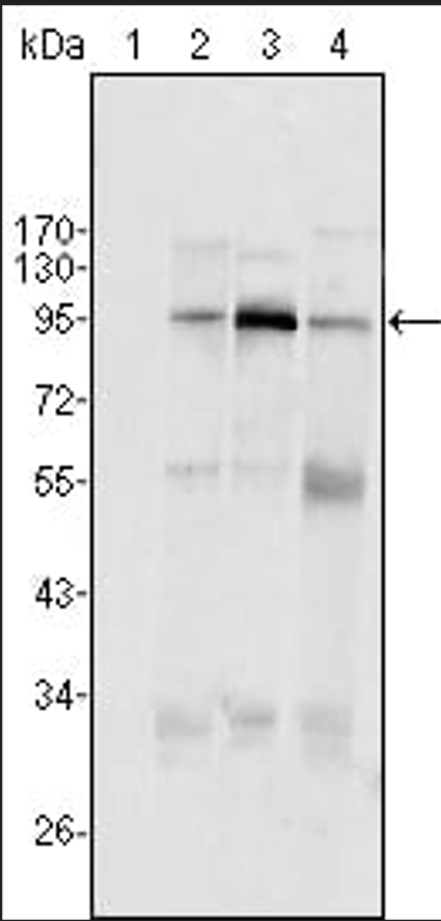
| WB | 1/500 - 1/2000 | Human,Mouse,Rat |
| IF | 咨询技术 | Human,Mouse,Rat |
| IHC | 咨询技术 | Human,Mouse,Rat |
| ICC | 技术咨询 | Human,Mouse,Rat |
| FCM | 咨询技术 | Human,Mouse,Rat |
| Elisa | 1/10000 | Human,Mouse,Rat |
| Aliases | p100; TDRD11; TudorSN |
| Entrez GeneID | 27044 |
| clone | 2D7 |
| WB Predicted band size | 102kDa |
| Host/Isotype | Mouse IgG1 |
| Antibody Type | Primary antibody |
| Storage | Store at 4°C short term. Aliquot and store at -20°C long term. Avoid freeze/thaw cycles. |
| Species Reactivity | Human |
| Immunogen | Purified recombinant fragment of SND1 (aa361-485) expressed in E. Coli. |
| Formulation | Ascitic fluid containing 0.03% sodium azide. |
+ +
以下是关于SND1/P100抗体的3篇参考文献及其摘要概括:
1. **文献名称**:*SND1 interacts with the RNA-induced silencing complex and plays a role in RNA interference*
**作者**:Caudy, A.A. et al.
**摘要**:该研究首次发现SND1(P100)是RNA诱导沉默复合体(RISC)的组成部分,利用特异性抗体证实其在RNA干扰(RNAi)中的关键作用,并揭示了其通过结合Argonaute蛋白调控基因沉默的分子机制。
2. **文献名称**:*SND1/P100 is a transcriptional co-activator involved in NF-κB and STAT6 signaling*
**作者**:Yang, J. et al.
**摘要**:作者通过免疫共沉淀和抗体阻断实验,证明SND1作为转录共激活因子,通过与NF-κB和STAT6转录复合物相互作用,增强炎症及癌症相关基因的表达,为靶向SND1的抗肿瘤治疗提供依据。
3. **文献名称**:*Epstein-Barr virus LMP1 enhances SND1/P100 stabilization to promote cell proliferation in nasopharyngeal carcinoma*
**作者**:Lu, J. et al.
**摘要**:研究利用SND1抗体发现EB病毒LMP1蛋白通过抑制泛素化降解途径稳定SND1/P100蛋白,促进鼻咽癌细胞增殖,揭示了SND1在病毒致癌中的调控网络及临床预后价值。
---
以上研究均通过特异性抗体阐明SND1/P100在RNA代谢、信号转导及癌症中的功能,适用于分子机制及疾病模型研究。
SND1 (Staphylococcal nuclease domain-containing protein 1), also known as p100. is a multifunctional protein initially identified as a transcriptional coactivator interacting with transcription factors like STAT5 and STAT6. It contains four staphylococcal nuclease-like (SN) domains and a Tudor domain, enabling its involvement in diverse cellular processes, including RNA interference, mRNA splicing, transcriptional regulation, and viral genome replication. SND1/p100 localizes to both the cytoplasm and nucleus, playing roles in gene silencing, miRNA processing, and maintaining RNA stability.
The SND1/p100 antibody is a key tool for studying these functions, particularly in cancer research. Overexpression of SND1 has been linked to tumor progression in cancers such as breast, liver, and glioblastoma, where it promotes cell proliferation, invasion, and therapy resistance. The antibody enables detection of SND1 protein levels via techniques like Western blotting, immunohistochemistry, and immunoprecipitation, aiding investigations into its oncogenic mechanisms. Additionally, it has applications in virology, as SND1 supports replication of viruses like HCV and HIV-1. Recent studies also explore its role in metabolic regulation and neurodegenerative diseases. Commercial SND1/p100 antibodies are typically raised against specific epitopes, with validation across species (human, mouse, rat), making them essential for both basic research and translational studies targeting SND1 as a potential therapeutic biomarker.
×